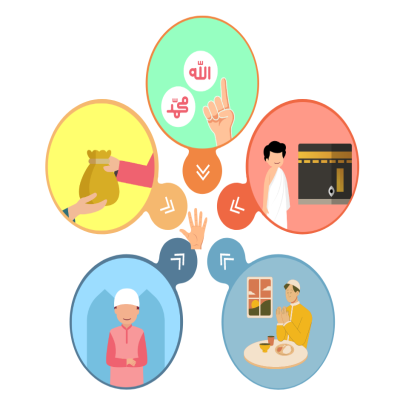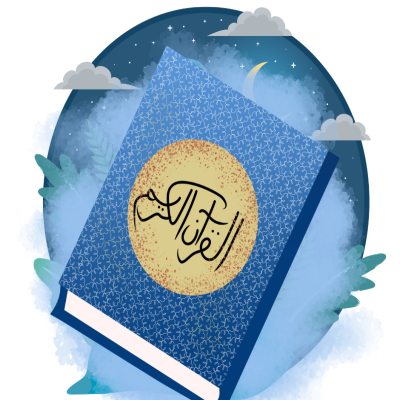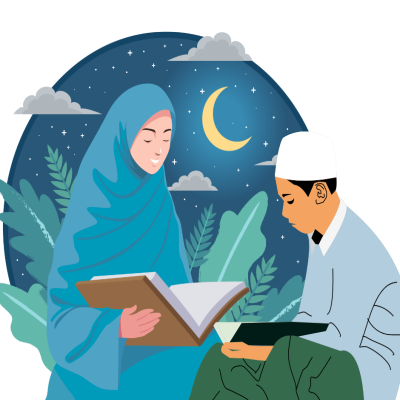
The Five Pillars of Islam Online course
The five pillars are fundamental of Islam. These are the foundations of a Muslim's beliefs and actions. Understanding the Five Pillars is crucial for anyone exploring Islam, as they encapsulate the core practices that guide a Muslim's daily life.
Learn all about these obligatory rulings and tell your child through this course of Talimus Sunnah Academy. We designed the course to be very simple and understandable.
Each pillar represents a unique aspect of devotion, from proclaiming one's belief to directly supporting the community. For Muslims, these practices are not just religious duties but pathways to personal growth and spiritual development. They foster a sense of unity and shared identity among adherents worldwide, while also emphasizing personal responsibility and discipline. By adhering to these pillars, Muslims aim to live a balanced, righteous life in accordance with their faith.
The Essence Of The Five Pillars
The Five Pillars of Islam embody the core values and acts of worship that define a Muslim's faith and practices. They form a foundation upon which believers build their lives, guiding their actions and decisions daily.
Foundation Of Islamic Faith
The Five Pillars are essential for every Muslim. They unite believers across the world, creating a sense of global unity. These pillars are:
- kalima: To bear witness that there is no god but Allah, and that He has no partner, and that Muhammad is His slave and Messenger.
- Salah: Performing five daily prayers facing the Kaaba in Mecca.
- Zakat: Giving a fixed portion of wealth to those in need.
- Fasting: Usually the practice of abstaining from food, drink, sexual activity.
- Hajj: able Muslims visiting the holy city of Mecca.
Kalimah: Declaration of Faith
Kalima stands as the first pillar of Islam. This shows the deep faith of Muslims in Islam.
Kalima Shahada meaning in English
The Shahada says, "There is no god but Allah and Muhammad is the Messenger of Allah." These words are powerful. Muslims believe in one God. They also believe that Muhammad (peace be upon him) is his last prophet. Saying this is the first step to becoming a Muslim. You have to say it with a clear heart and mind.
Role In Muslim Identity
Kalima is not just words. It shapes the life of a Muslim. It guides them in their actions and thoughts.
- It is the key to enter Islam.
- It defines who is a Muslim.
- It guides them in daily life.
Salat: The Ritual Prayer
The practice of Salat stands as a cornerstone in the life of a Muslim. This ritual prayer, performed five times a day, is a testament to the devotion and discipline in the Islamic faith. It serves as a constant reminder of the spiritual connection to the Divine. Each prayer punctuates the day, aligning the faithful with their beliefs and the rhythm of the Islamic world.
Performing The Five Daily Prayers
For Muslims, the day revolves around Salat. Each prayer has a specific time:
- Fajr - at dawn, before sunrise
- Dhuhr - just after midday
- Asr - in the late afternoon
- Maghrib - just after sunset
- Isha - during the evening
Prayers consist of a series of movements and recitations. Muslims must first perform Wudu, the ritual cleansing. They then stand, bow, and prostrate while reciting verses from the Quran. The direction of prayer is towards the Kaaba in Mecca, Saudi Arabia.
Spiritual Significance Of Salat
The daily prayers form a spiritual foundation for Muslims. Each Salat serves a unique purpose:
| Prayer | Significance |
|---|---|
| Fajr | Starts the day with remembrance of God |
| Dhuhr | Break in the day for reflection and worship |
| Asr | Afternoon prayer to remember God's presence |
| Maghrib | Marks the end of the day's work and the beginning of rest |
| Isha | Nighttime prayer to end the day with God's remembrance |
Zakat: Almsgiving And Charity
Zakat stands as a core pillar of Islam. It blends faith with action. This act purifies the giver's wealth. It also supports community well-being.
Purifying Wealth Through Giving
Islam teaches that giving Zakat cleanses your money. It's not just charity, it's a duty. Muslims calculate 2.5% of their savings. They give this to the poor each year. This practice ensures that wealth circulates. It prevents hoarding. Everyone benefits.
Impact On Social Welfare
- Zakat reduces poverty.
- It helps bridge the gap between rich and poor.
- Communities grow stronger with Zakat funds.
- It funds education, healthcare, and emergency relief.
Zakat makes a real difference. It aids those facing hard times. This giving nurtures compassion in society.
Sawm: Fasting During Ramadan
The habit of abstaining from food, drink, sexual activity.
Fasting during Ramadan
Fasting during Ramadan is not just about eating and drinking. It is time to focus on purifying the soul and fostering spirituality. Muslims wake up early in the morning for Sehri and break their fast with the food Iftar after sunset. Fasting includes avoiding food, drink, and other physical needs during daylight hours.
Suhoor – Eating food before dawn.
Iftar – Eating food after sunset.
Fasting as a means of self-purification
Fasting during Ramadan is more than being hungry and thirsty. This sacred practice helps Muslims develop self-discipline. It teaches patience, humility, and control over desire. Fasting is a way to purify the body and mind. It brings Muslims closer to God and those in need
Spiritual Significance Of Sawm:
1)Develops self-discipline and control over desires.
2)Teaches patience and humility.
3)Helps cleanse the body and mind.
4)About Five Pillars of Islam: Unveiling Core Beliefs
5)Strengthens community bonds and empathy for the less fortunate
Hajj: Pilgrimage To Mecca
The Hajj stands as a unique journey, central to Muslim faith. It calls believers to Mecca, the heart of Islam. This pilgrimage is a duty for Muslims, to be performed at least once. It signifies equality and devotion. Let's delve into the stages of this spiritual voyage and the unity it fosters.
Stages Of The Hajj Journey
Hajj involves specific rituals over five to six days. Each stage reflects deep meanings.
- Ihram: Pilgrims wear special white clothing. It shows purity and equality.
- Tawaf: They circle the Kaaba seven times. This act honors Allah's house.
- Sa'i: Walking between Safa and Marwah. It recalls Hagar's search for water.
- Arafat: Standing from noon to sunset. It's a day of reflection.
- Muzdalifah: Gathering pebbles at night. These are for the next ritual.
- Rami al-Jamarat: Throwing stones at pillars. It defies evil.
- Eid al-Adha: Offering a sacrifice. It honors Prophet Ibrahim's faith.
- Tawaf Al-Ifadah: Another circling of the Kaaba. It marks the pilgrimage's completion.
Universal Brotherhood In Islam
Hajj showcases the Islamic principle of brotherhood. Every pilgrim is equal before Allah.
Pilgrims come from all corners of the world. They wear the same clothing and perform the same acts. This unity transcends language, race, and status.
Believers share meals, prayers, and experiences. They return home with a renewed sense of global Muslim community.
Enroll now to learn more about five topics
Another Courses
Planning & Pricing
$35/€32
PLAN #A
- 2 days class per week
- Class Duration:40 minutes
- Course Period:According To Student's Ability
- Gender:Both Male/Female
- Languages:Bangla/English/Urdu
$40/€37
PLAN #B
- 3 days class per week
- Class Duration:40 minutes
- Course Period:According To Student's Ability
- Gender:Both Male/Female
- Languages:Bangla/English/Urdu
$45/€42
PLAN #C
- 4 days class per week
- Class Duration:40 minutes
- Course Period:According To Student's Ability
- Gender:Both Male/Female
- Languages:Bangla/English/Urdu
$50/€46
PLAN #D
- 5 days class per week
- Class Duration:40 minutes
- Course Period:According To Student's Ability
- Gender:Both Male/Female
- Languages:Bangla/English/Urdu






 cours for kids & adalts.png)


